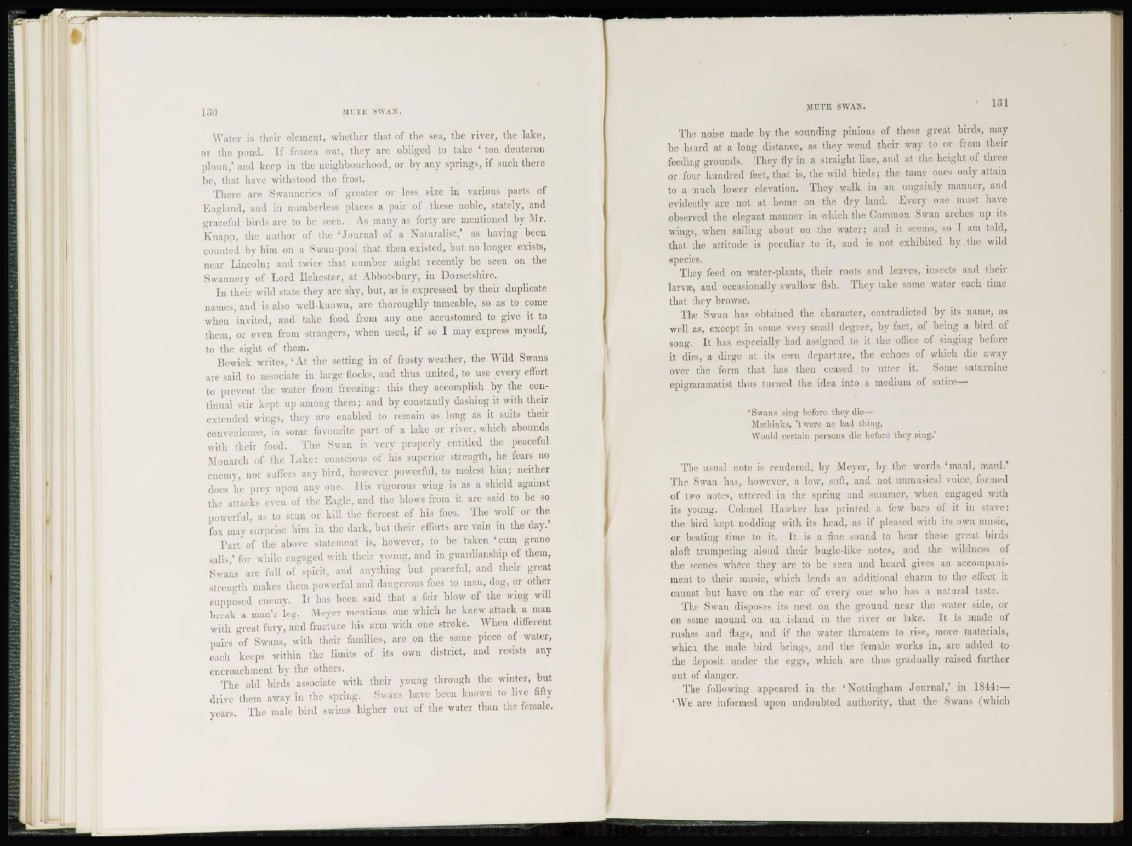
Water is their element, whether that of the sea, the river, the lake,
or the pond. If frozen out, they are obliged to take ' ton deuteron
ploun,' anil keep in the neighbourhood, or by any springs, if such there
be, that have withstood the frost.
There are Swanneries of greater or less size in various parts of
England, and in numberless places a pair of these noble, stately, and
graceful birds are to be seen. As many as forty are mentioned bv Mr.
Knapp, the author of the 'Journal of a Naturalist,' as having been
counted by him on a Swan-pool that then existed, but no longer exists,
near Lincoln; and twice that number might recently be seen on the
Swannery of Lord Ilchester, at Abbotsbury, in Dorsetshire.
I n their wild state they arc shy, but, as is expressed by their duplicate
names, and is also well-known, are thoroughly tameable, so as to come
when invited, and take food from any one accustomed to give it to
them, or even from strangers, when used, if so I may express myself,
to the sight of them.
Bewick writes, ' A t the setting in of frosty weather, the Wild Swans
are said to associate in large flocks, and thus united, to use every effort
to prevent the water from freezing: this they accomplish by the continual
stir kept up among them; and by constantly dashing it with their
extended wings, they are enabled to remain as long as it suits their
convenience, in some favourite part of a lake or river, which abounds
with their food. The Swan is very properly entitled the peaceful
Monarch of the Lake: conscious of his superior strength, he fears no
enemy, nor suffers any bird, however powerful, to molest him; neither
does he prey upon any one. His vigorous wing is as a shield against
the attacks even of the Eagle, and the blows from it are said to be so
powerful, as to stun or kill the fiercest of his foes. The wolf or the
fox may surprise him in the dark, but their efforts are vain in the day.'
Part of the above statement is, however, to be taken ' c um grano
salis,' for while engaged with their young, and in guardianship of them,
Swanfl are full of spirit, and anything but peaceful, and then- great
strength makes them powerful and dangerous foes to man, dog, or other
supposed enemy. It has been said that a fair blow of the wing will
break a man's leg. Meyer mentions one which he knew attack a man
with great fury, and fracture his arm with one stroke. When different
pairs of Swans, with their families, are on the same piece of water,
each keeps within the limits of its own district, and resists any
encroachment by the others.
The old birds associate with their young through the winter, but
drive them away in the spring. Swans have been known to live fifty
years. The male bird swims higher out of the water than the female.
The noise made by the sounding pinions of these great birds, may
be heard at a long distance, as they wend their way to or from their
feeding grounds. They fly in a straight line, and at I he height of three
or four hundred feet, that is, the wild birds; the tame oucs only attain
to a much lower elevation. They walk in an ungainly manner, and
evidently are not at home on the dry laud. Every one must have
observed the elegant manner in which the Common Swan arches up its
wings, when sailing about on the water; and it seeins, so I am told,
that the attitude is peculiar to it, and is not exhibited by the wild
species.
They feed on water-plants, their roots and leaves, insects and their
larva;, and occasionally swallow fish. They take some water eacli time
that they browse.
The Swan has obtained the character, contradicted by its name, as
well as, except in some very small degree, by fact, of being a bird of
song. It has especially had assigned to it the office of singing before
it dies, a dirge at its own departure, the echoes of which die away
over the form that has then ceased to utter it. Some saturnine
epigrammatist thus turned the idea into a medium of satire—
'Swans sing before they die—
ilethinks, 'twere no bad thing,
Would certain persons die before they aing."
The usual note is rendered, by Meyer, by the words 'maul, maul.'
The Swan has, however, a low, soft, and not unmusical voice, formed
of two notes, uttered in the spring and summer, when engaged with
its young. Colonel Hawker has printed a few bars of it in stave:
the bird kept nodding with its head, as if pleased with its own music,
or beating time to it. It is a fine sound to hear these great birds
aloft trumpeting aloud their bugledike notes, and the wilduess of
the scenes where they arc to be seen and heard gives an accompaniment
to their music, which lends an additional charm to the effect it
cannot but have on the ear of every one who lias a natural taste.
The Swan disposes its nest on the ground near the water side, or
on some mound on an island in the river or lake. It is made of
rushes and flags, and if the water threatens to rise, more materials,
which the male bird brings, and the female works in, arc added to
the deposit under the eggs, which are thus gradually raised further
out of danger.
The following appeared in the 'Nottingham Journal,' in 18-1-1:—
'AVe are informed upon undoubted authority, that the Swans (which